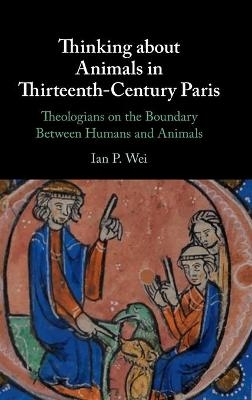
Thinking about Animals in Thirteenth-Century Paris
Theologians on the Boundary Between Humans and Animals
Seiten
2020
Cambridge University Press (Verlag)
978-1-108-83015-7 (ISBN)
Cambridge University Press (Verlag)
978-1-108-83015-7 (ISBN)
Exploring the diverse ways in which theologians at the University of Paris in the thirteenth century understood the differences and similarities between humans and animals, this book analyses key theological works to demonstrate how thinking about animals became a crucial tool for generating knowledge of God and the whole of creation.
Exploring what theologians at the University of Paris in the thirteenth century understood about the boundary between humans and animals, this book demonstrates the great variety of ways in which they held similarity and difference in productive tension. Analysing key theological works, Ian P. Wei presents extended close readings of William of Auvergne, the Summa Halensis, Bonaventure, Albert the Great and Thomas Aquinas. These scholars found it useful to consider animals and humans together, especially with regard to animal knowledge and behaviour, when discussing issues including creation, the fall, divine providence, the heavens, angels and demons, virtues and passions. While they frequently stressed that animals had been created for use by humans, and sometimes treated them as tools employed by God to shape human behaviour, animals were also analytical tools for the theologians themselves. This study thus reveals how animals became a crucial resource for generating knowledge of God and the whole of creation.
Exploring what theologians at the University of Paris in the thirteenth century understood about the boundary between humans and animals, this book demonstrates the great variety of ways in which they held similarity and difference in productive tension. Analysing key theological works, Ian P. Wei presents extended close readings of William of Auvergne, the Summa Halensis, Bonaventure, Albert the Great and Thomas Aquinas. These scholars found it useful to consider animals and humans together, especially with regard to animal knowledge and behaviour, when discussing issues including creation, the fall, divine providence, the heavens, angels and demons, virtues and passions. While they frequently stressed that animals had been created for use by humans, and sometimes treated them as tools employed by God to shape human behaviour, animals were also analytical tools for the theologians themselves. This study thus reveals how animals became a crucial resource for generating knowledge of God and the whole of creation.
Ian P. Wei is Senior Lecturer in the Department of History at the University of Bristol where he co-founded the Centre for Medieval Studies. He has been a Member of the School of Social Science at the Institute for Advanced Study in Princeton (2009–10) and his previous publications include Intellectual Culture in Medieval Paris: Theologians and the University, c.1100–1330 (2012).
Introduction; 1. William of Auvergne; 2. The Summa Halensis and Bonaventure; 3. Albert the Great and Thomas Aquinas; Conclusion.
| Erscheinungsdatum | 24.08.2020 |
|---|---|
| Zusatzinfo | Worked examples or Exercises |
| Verlagsort | Cambridge |
| Sprache | englisch |
| Maße | 153 x 230 mm |
| Gewicht | 490 g |
| Themenwelt | Geisteswissenschaften ► Geschichte ► Regional- / Ländergeschichte |
| Geschichte ► Teilgebiete der Geschichte ► Kulturgeschichte | |
| Geschichte ► Teilgebiete der Geschichte ► Religionsgeschichte | |
| ISBN-10 | 1-108-83015-3 / 1108830153 |
| ISBN-13 | 978-1-108-83015-7 / 9781108830157 |
| Zustand | Neuware |
| Informationen gemäß Produktsicherheitsverordnung (GPSR) | |
| Haben Sie eine Frage zum Produkt? |
Mehr entdecken
aus dem Bereich
aus dem Bereich
der stille Abschied vom bäuerlichen Leben in Deutschland
Buch | Hardcover (2023)
C.H.Beck (Verlag)
CHF 32,15
vom Mittelalter bis zur Gegenwart
Buch | Softcover (2024)
C.H.Beck (Verlag)
CHF 16,80


